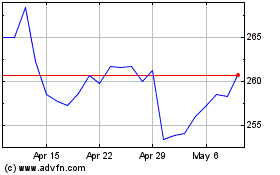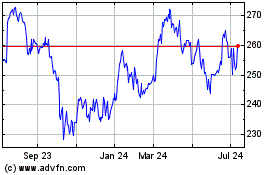By Robbie Whelan and Santiago Pérez
MEXICO CITY -- With global supply chains in disarray amid the
U.S.-China trade war and the coronavirus pandemic, Mexico might
seem a logical winner if U.S. companies decide they want to
diversify away from China and make some products closer to
home.
Mexico clinched a new trade deal with the U.S. and Canada last
year and has now replaced China as the U.S.'s largest single
trading partner.
"These trade frictions between the U.S. and China and the
coronavirus should definitely be a godsend to Mexico," said Alberto
Ramos, chief Latin America economist at Goldman Sachs Group Inc.
"Mexico would be extremely well positioned to capture part of that
trade."
While Mexico might benefit in the long run, there are plenty of
reasons to be cautious about predicting a flood of companies
heading there. For starters, the data doesn't suggest Mexico is
enjoying an investment boom.
Foreign direct investment in Mexico fell 5.2% last year compared
with 2018, according to preliminary government figures, while the
economy shrank by 0.1% in 2019. Mexico's exports to the U.S. have
grown modestly over the past year and a half, far slower than those
from countries like Vietnam.
Supply-chain experts point to several factors. Despite the new
U.S.-Mexico-Canada trade deal, the Trump administration could upend
trade relations at any time.
Adding to the uncertainty are the economic policies of Mexico's
nationalist President Andrés Manuel López Obrador and increasing
violence that has turned parts of the country into no-go areas.
"I don't think trade relations are sufficiently settled to boost
long-term investment in Mexico as a hub," said Gustavo Rangel,
chief Latin America economist at ING Financial Markets. "Clearly
China is a riskier bet, but it's unclear to what extent that
benefited Mexico."
Apart from a jump in automotive exports in 2018, Mexico's
manufactured exports haven't responded to the U.S.-China trade
tensions with the expected surge, according to economist Brad
Setser, a senior fellow at the Council on Foreign Relations.
Meantime, annual growth in U.S. imports of manufactured goods
from Vietnam jumped to more than 40% in early 2019, and remained
above 30% through the end of the year, according to Census Bureau
data. Monthly U.S. imports of manufactures from Mexico grew around
10% a month in early 2019 but were falling at the end of the year,
while U.S. import growth from China contracted sharply all
year.
"It's impossible to make an argument in a statistical sense that
there has been a large visible shift to Mexico," Mr. Setser
said.
A big reason manufacturing might be sticking in Asia rather than
relocating is that supply chains in industries like electronics are
deeply entrenched, and Mexico lacks a deep supply chain in areas
outside the automotive sector, Mr. Setser said. Overall costs in
Asia are also still low.
Mexico, however, could still benefit over the longer term.
Manufacturing wages in Mexico are lower than in China, and the
country isn't only next door to the U.S., but also shares cultural
ties and similar time zones with U.S. firms.
In January, Jose Luis Bernal, Mexico's ambassador to China, said
that at least three Chinese auto firms, including car maker
Changan, electric-car manufacturer BYD and assembly and auto parts
firm JAC Motors, planned to begin or expand production in Mexico in
the next year.
And last year, sports-camera maker GoPro Inc. moved most
production of its U.S.-bound cameras from China to the Mexican city
of Guadalajara. At the time, a GoPro executive said the decision
"supports our goal to insulate us against possible tariffs as well
as recognize some cost savings and efficiencies."
Mr. López Obrador's policies are also undermining Mexico's
foreign-investment potential, observers say. In his first year in
office, he canceled the country's biggest public-works project, a
partially built Mexico City airport, and halted any new oil
auctions for private oil firms.
The latest private-sector casualty could be Constellation Brands
Inc., which brews Mexico's venerable Corona beer for U.S. drinkers.
The López Obrador administration is organizing a referendum on
March 21 in the border city of Mexicali to decide whether the beer
maker, one of Mexico's largest foreign investors, can complete
construction of a $1.4 billion plant, after community groups raised
objections about its intensive water consumption. The cancellation
of such a large-scale project would send a wrong signal to foreign
investors, executives say.
Mexico's lagging foreign investment is a long-term trend.
Foreign direct investment averaged 1.6% of Mexico's gross domestic
product over the past decade, compared with an average of 2.2% of
GDP from 1995 to 2007, estimates Sergi Lanau, deputy chief
economist at the Institute of International Finance in Washington,
D.C.
Out-of-control criminal violence doesn't help. Last year was the
bloodiest in Mexico's recent history, with 35,588 people murdered,
according to government estimates.
In 2018, the American Chamber of Mexico, an association of
business groups, polled 415 of its members on security issues and
found that 25% of them believed their businesses were less safe
than the previous year. Of those, 71% attributed the decline in
security to the rise of organized crime. More than 14% of
businesses questioned said they had suspended operations in certain
Mexican states because of rising violence.
--David Luhnow and Anthony Harrup contributed to this
article.
Write to Robbie Whelan at robbie.whelan@wsj.com and Santiago
Pérez at santiago.perez@wsj.com
(END) Dow Jones Newswires
March 15, 2020 07:14 ET (11:14 GMT)
Copyright (c) 2020 Dow Jones & Company, Inc.
Constellation Brands (NYSE:STZ)
Historical Stock Chart
From Mar 2024 to Apr 2024

Constellation Brands (NYSE:STZ)
Historical Stock Chart
From Apr 2023 to Apr 2024
